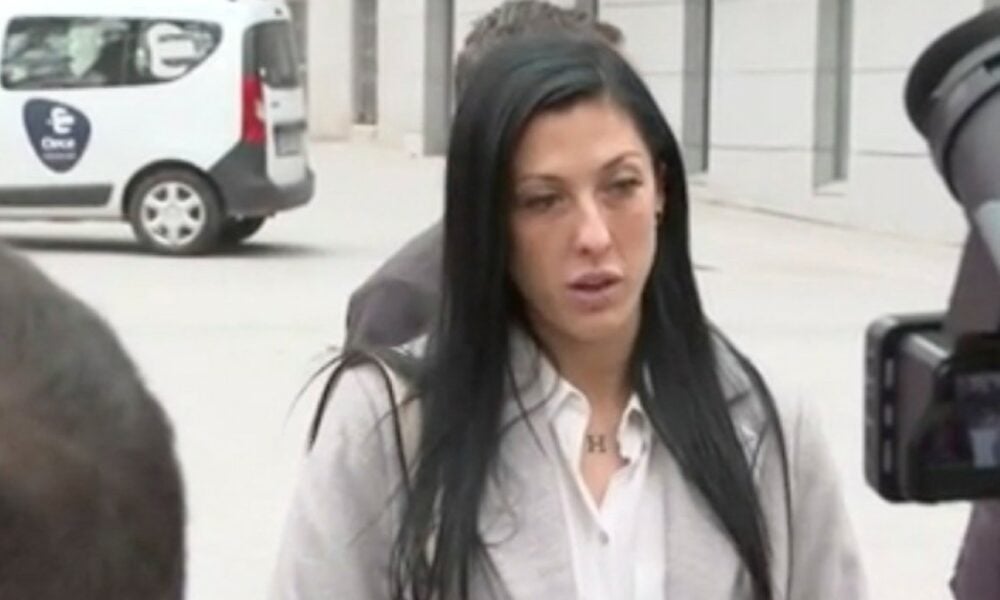Jenni Hermoso to Appeal Sentence That Convicted Luis Rubiales to a Fine for Sexual Assault
The case involving former president of the Royal Spanish Football Federation (RFEF), Luis Rubiales, and player Jenni Hermoso continues to gain global attention. The Spanish court’s decision to sentence Rubiales to a €10,800 fine for sexual assault after he kissed Hermoso without consent during the 2023 Women’s World Cup award ceremony has sparked dissatisfaction and new developments. In addition to the fine, he was prohibited from approaching the athlete for one year. However, the court acquitted him of the coercion charge, which alleged that he and his team pressured Hermoso to downplay the incident and publicly state that the kiss was consensual. Given the ruling, both Hermoso’s legal team and Rubiales’ defense have announced their intention to appeal, showing that the legal battle is far from over.
Hermoso’s defense expressed outrage over the verdict, deeming the penalty too lenient and disproportionate to the impact the case had on her life and career. The fine imposed on Rubiales was not considered sufficient to punish the assault and prevent similar behaviors in the future.
Rubiales’ legal team, on the other hand, maintains that the kiss was consensual and that the court’s decision is unfair. His lawyers will appeal to overturn the conviction, arguing that the context of the episode was not adequately taken into account.

Legal Developments and Social Impact
The case has had a significant impact not only on women’s football but also on broader discussions about harassment and consent. Legal experts are analyzing the ruling and highlight that, while the conviction is a step forward in recognizing the severity of non-consensual acts, the imposed penalty raises questions about the effectiveness of punishments in such cases.
Rubiales’ acquittal on the coercion charge has caused outrage, especially since there are reports that Hermoso was pressured by RFEF officials and Rubiales himself to downplay the incident. This raises concerns about the difficulty of proving coercion in similar cases and the need to strengthen laws to protect victims from abuses of power.
The case’s public reaction underscores the importance of ensuring a safe environment for athletes and sports professionals. Many feminist organizations and gender violence experts have criticized the imposed penalty and advocate for legal reforms to prevent such cases from being met with lenient punishment.
Consequences for Luis Rubiales and Spanish Football
Since the incident, Rubiales has faced multiple consequences. His resignation as RFEF president was a direct result of public pressure and the negative fallout from the case. The Federation underwent a restructuring, leading to the dismissal of Jorge Vilda, the women’s national team coach at the time, who supported Rubiales during the scandal.
FIFA also intervened, suspending Rubiales from football-related activities for three years, affecting his professional trajectory. Although the conviction does not involve imprisonment, it reinforces Rubiales’ removal from the sports scene and may hinder his return to leadership roles.
Spanish women’s football showed strong solidarity with Hermoso. After the incident, national team players announced they would not return to the squad until structural changes were made within the federation. This movement resulted in improvements in the organization of women’s football in Spain and demonstrated the players’ strength in demanding respect and equality.
How the Decision Influences Sports and Legislation
Rubiales’ sentencing could have long-term impacts on future legislation regarding harassment and assault in sports. The debate over the proportionality of penalties for such crimes is gaining momentum, with human rights organizations advocating for stricter punishments in cases of sexual assault and abuse of power in sports environments.
The Hermoso-Rubiales case has also highlighted the need for stricter regulations within sports federations. Many organizations have begun reviewing their codes of conduct to ensure greater protection for athletes, prevent harassment, and ensure that complaints are handled seriously and promptly.
Key Points of the Case and Its Repercussions
- Non-consensual kiss: Rubiales kissed Hermoso at the 2023 Women’s World Cup award ceremony, causing global backlash.
- Court ruling: He was sentenced to a €10,800 fine and banned from approaching Hermoso for a year.
- Acquittal on coercion charges: Despite claims of pressure to downplay the case, Rubiales was cleared of this accusation.
- Judicial appeals: Both Hermoso’s defense and Rubiales’ lawyers have announced they will appeal the ruling.
- Impact on RFEF: The case led to leadership changes within the Spanish Football Federation, including Rubiales’ resignation.
- Women’s football response: Players showed strong support for Hermoso and demanded structural changes in the federation.
- FIFA suspension: Rubiales was banned from football activities for three years.
- Debate over punishment: The imposed fine was deemed too lenient by activists and legal experts.
- Global reaction: The case fueled discussions on consent and harassment in sports.
- Potential legal reforms: Lawmakers and feminist organizations are calling for stricter penalties for similar cases.
Relevant Data on Harassment in Sports
- According to a European Union study, around 40% of professional female athletes have experienced some form of harassment or abuse during their careers.
- Research indicates that only 15% of harassment cases in sports are reported due to fear of retaliation and lack of adequate support.
- In 2023, FIFA recorded a 60% increase in misconduct complaints involving managers and coaches compared to the previous year.
- A United Nations (UN) report shows that countries with stricter laws on sports harassment have lower recidivism rates for these crimes.
- The Hermoso-Rubiales case led to the creation of new safety protocols for athletes in Spain and other international federations.
Timeline of the Hermoso-Rubiales Case
- August 20, 2023: Rubiales kisses Hermoso without consent at the Women’s World Cup awards ceremony.
- August 21, 2023: Hermoso states that she did not consent to the kiss.
- August 25, 2023: Rubiales refuses to resign and claims the kiss was consensual.
- August 26, 2023: FIFA provisionally suspends Rubiales.
- September 10, 2023: Rubiales resigns as RFEF president.
- October 30, 2023: FIFA bans Rubiales from football activities for three years.
- February 15, 2024: Spanish court sentences Rubiales to a €10,800 fine and bans him from approaching Hermoso.
- February 20, 2024: Both Hermoso and Rubiales announce they will appeal the ruling.
The Future of the Case and Its Developments
Although Rubiales’ conviction was a milestone in the fight against harassment in sports, the controversy over the applied penalty reinforces the need for more structural changes. With ongoing appeals, the Hermoso-Rubiales case will likely continue to generate legal and social debates regarding consent, power dynamics, and proportional punishment for sexual assault crimes. The mobilization of athletes and human rights organizations will continue to monitor future developments, pushing for progress that protects victims and ensures safer and more respectful sports environments.

The case involving former president of the Royal Spanish Football Federation (RFEF), Luis Rubiales, and player Jenni Hermoso continues to gain global attention. The Spanish court’s decision to sentence Rubiales to a €10,800 fine for sexual assault after he kissed Hermoso without consent during the 2023 Women’s World Cup award ceremony has sparked dissatisfaction and new developments. In addition to the fine, he was prohibited from approaching the athlete for one year. However, the court acquitted him of the coercion charge, which alleged that he and his team pressured Hermoso to downplay the incident and publicly state that the kiss was consensual. Given the ruling, both Hermoso’s legal team and Rubiales’ defense have announced their intention to appeal, showing that the legal battle is far from over.
Hermoso’s defense expressed outrage over the verdict, deeming the penalty too lenient and disproportionate to the impact the case had on her life and career. The fine imposed on Rubiales was not considered sufficient to punish the assault and prevent similar behaviors in the future.
Rubiales’ legal team, on the other hand, maintains that the kiss was consensual and that the court’s decision is unfair. His lawyers will appeal to overturn the conviction, arguing that the context of the episode was not adequately taken into account.

Legal Developments and Social Impact
The case has had a significant impact not only on women’s football but also on broader discussions about harassment and consent. Legal experts are analyzing the ruling and highlight that, while the conviction is a step forward in recognizing the severity of non-consensual acts, the imposed penalty raises questions about the effectiveness of punishments in such cases.
Rubiales’ acquittal on the coercion charge has caused outrage, especially since there are reports that Hermoso was pressured by RFEF officials and Rubiales himself to downplay the incident. This raises concerns about the difficulty of proving coercion in similar cases and the need to strengthen laws to protect victims from abuses of power.
The case’s public reaction underscores the importance of ensuring a safe environment for athletes and sports professionals. Many feminist organizations and gender violence experts have criticized the imposed penalty and advocate for legal reforms to prevent such cases from being met with lenient punishment.
Consequences for Luis Rubiales and Spanish Football
Since the incident, Rubiales has faced multiple consequences. His resignation as RFEF president was a direct result of public pressure and the negative fallout from the case. The Federation underwent a restructuring, leading to the dismissal of Jorge Vilda, the women’s national team coach at the time, who supported Rubiales during the scandal.
FIFA also intervened, suspending Rubiales from football-related activities for three years, affecting his professional trajectory. Although the conviction does not involve imprisonment, it reinforces Rubiales’ removal from the sports scene and may hinder his return to leadership roles.
Spanish women’s football showed strong solidarity with Hermoso. After the incident, national team players announced they would not return to the squad until structural changes were made within the federation. This movement resulted in improvements in the organization of women’s football in Spain and demonstrated the players’ strength in demanding respect and equality.
How the Decision Influences Sports and Legislation
Rubiales’ sentencing could have long-term impacts on future legislation regarding harassment and assault in sports. The debate over the proportionality of penalties for such crimes is gaining momentum, with human rights organizations advocating for stricter punishments in cases of sexual assault and abuse of power in sports environments.
The Hermoso-Rubiales case has also highlighted the need for stricter regulations within sports federations. Many organizations have begun reviewing their codes of conduct to ensure greater protection for athletes, prevent harassment, and ensure that complaints are handled seriously and promptly.
Key Points of the Case and Its Repercussions
- Non-consensual kiss: Rubiales kissed Hermoso at the 2023 Women’s World Cup award ceremony, causing global backlash.
- Court ruling: He was sentenced to a €10,800 fine and banned from approaching Hermoso for a year.
- Acquittal on coercion charges: Despite claims of pressure to downplay the case, Rubiales was cleared of this accusation.
- Judicial appeals: Both Hermoso’s defense and Rubiales’ lawyers have announced they will appeal the ruling.
- Impact on RFEF: The case led to leadership changes within the Spanish Football Federation, including Rubiales’ resignation.
- Women’s football response: Players showed strong support for Hermoso and demanded structural changes in the federation.
- FIFA suspension: Rubiales was banned from football activities for three years.
- Debate over punishment: The imposed fine was deemed too lenient by activists and legal experts.
- Global reaction: The case fueled discussions on consent and harassment in sports.
- Potential legal reforms: Lawmakers and feminist organizations are calling for stricter penalties for similar cases.
Relevant Data on Harassment in Sports
- According to a European Union study, around 40% of professional female athletes have experienced some form of harassment or abuse during their careers.
- Research indicates that only 15% of harassment cases in sports are reported due to fear of retaliation and lack of adequate support.
- In 2023, FIFA recorded a 60% increase in misconduct complaints involving managers and coaches compared to the previous year.
- A United Nations (UN) report shows that countries with stricter laws on sports harassment have lower recidivism rates for these crimes.
- The Hermoso-Rubiales case led to the creation of new safety protocols for athletes in Spain and other international federations.
Timeline of the Hermoso-Rubiales Case
- August 20, 2023: Rubiales kisses Hermoso without consent at the Women’s World Cup awards ceremony.
- August 21, 2023: Hermoso states that she did not consent to the kiss.
- August 25, 2023: Rubiales refuses to resign and claims the kiss was consensual.
- August 26, 2023: FIFA provisionally suspends Rubiales.
- September 10, 2023: Rubiales resigns as RFEF president.
- October 30, 2023: FIFA bans Rubiales from football activities for three years.
- February 15, 2024: Spanish court sentences Rubiales to a €10,800 fine and bans him from approaching Hermoso.
- February 20, 2024: Both Hermoso and Rubiales announce they will appeal the ruling.
The Future of the Case and Its Developments
Although Rubiales’ conviction was a milestone in the fight against harassment in sports, the controversy over the applied penalty reinforces the need for more structural changes. With ongoing appeals, the Hermoso-Rubiales case will likely continue to generate legal and social debates regarding consent, power dynamics, and proportional punishment for sexual assault crimes. The mobilization of athletes and human rights organizations will continue to monitor future developments, pushing for progress that protects victims and ensures safer and more respectful sports environments.











Post Comment